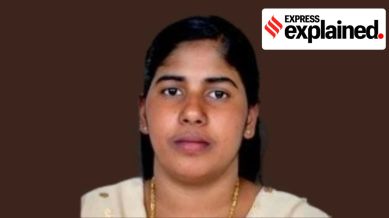Nimisha Priya Case: What option does Kerala nurse on death row in Yemen have?
Kerala Nurse Nimisha Priya Case: Yemen President Rashad al-Alami on Monday approved the death penalty for Kerala nurse Nimisha Priya, accused in the murder of a Yemeni citizen. Her only option now is 'blood money'. We explain.

Kerala Nurse Nimisha Priya Case: The Ministry of External Affairs (MEA) on Tuesday (December 31) said it is extending “all possible help” to secure the release of Nimisha Priya, a nurse from Kerala. This comes a day after President of Yemen Rashad al-Alimi sanctioned her death sentence for allegedly murdering a Yemeni citizen in 2017.
“We are aware of the sentencing of Ms Nimisha Priya in Yemen,” MEA spokesperson Randhir Jaiswal said. “We understand that the family of Priya is exploring relevant options. The government is extending all possible help in the matter,” he added.
monthly limit of free stories.
with an Express account.
The Palakkad native was imprisoned for the killing of Yemeni citizen Talal Abdo Mehdi in July 2017. She was apprehended while trying to flee the country and sentenced to death in 2020. The Supreme Judicial Council dismissed her appeal in November 2023.
What is the case against Nimisha Priya? And is there any legal option before her to stall the death sentence conviction? We explain.
What is the case against Nimisha Priya?
After qualifying as a nurse, Priya moved to Yemen in 2008. In 2011, she married Tomy Thomas in Kerala, with whom she returned to Yemen. She worked as a nurse, while he worked as an electrician. Both dreamt of starting their own clinic but to do this, they needed to partner with a local resident under Yemeni law.
Enter Talal Abdo Mahdi. A regular at the clinic where Priya worked as a nurse, the couple approached Mahdi for help. Mahdi even came to Kerala in 2015, to attend the baptism of Priya’s daughter. While Priya managed to return to Yemen, the civil war (that began in 2014) prevented her husband and daughter from doing so. They remained in Kerala.
In Yemen, Mahdi opened a new clinic but refused to share his income with Priya. He also allegedly forged documents to present her as his wife. According to Priya’s family, what followed was a cycle of physical and sexual abuse. Priya was unable to leave because Mahdi had taken all her travel documents and passports. He also did not allow her to speak to her family in Kerala.
Fed up with this cycle of abuse, Priya, with the help of fellow nurse Hannan, allegedly tried to sedate Mahdi in a bid to obtain her papers. However, an overdose resulted in his death. Panicking, the duo decided to chop up Mahdi’s body and dump it in a water tank. Both were eventually arrested.
What is blood money?
According to Islamic law, victims of crimes have a say in how criminals are punished. In cases of murder, this principle applies to the families of victims. Although murder is punished via the death penalty, the victim’s family (specifically, heirs) may choose to “forgive” the murderer in exchange for monetary compensation.
This is the principle of diyya, or “blood money”. It can be traced to the Holy Quran: “O believers! The law of retaliation is set for you in cases of murder — a free man for a free man, a slave for a slave, and a female for a female. But if the offender is pardoned by the victim’s guardian, then ‘blood money’ should be decided fairly and payment should be made courteously. This is a concession and a mercy from your Lord.” [2:178]
Scholars believe that the idea behind this is to encourage the virtue of forgiveness, while also providing reparative justice to the victim’s family. The scriptures do not set any specific amount as compensation, with the sum generally arrived at via negotiation between the murderer’s family/representatives and the victim’s family. Some Islamic countries, however, have set minimum compensation amounts.
In November 2023, a $40,000 payment was made to get negotiations started. Priya’s family will likely have to pay up to $400,000 to waive the death penalty. The ‘Save Nimisha Priya International Action Council’, formed in 2020, is in the process of raising the required funds.